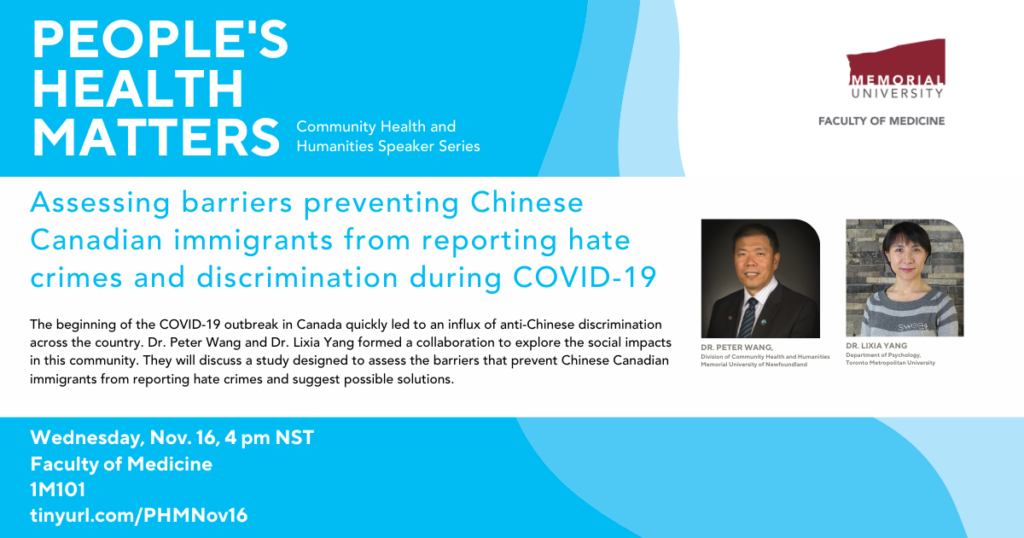
CNIW Nov 18, 2022 News
As a result of the Coronavirus disease (COVID-19) pandemic, pre-existing racial discrimination has been exacerbated in Canada, particularly among Chinese immigrants. In the past three, CNIW scientists have been actively working with their community partners, such as CCAA, to assess incidence and associated factors of Anti-Chinese discrimination during the COVID-19 pandemic.

Recently, Dr. Peter Wang and Dr. Lixia, co-directors of CNIW, were invited to share their research findings with Memorial University scholars and students through the People’s Health Matters guest speaker serial. Dr. Brenda Wilson , Dr. Brenda Wilson https://www.mun.ca/medicine/faculty-and-staff-resources/faculty-a-z/wilson-brenda.php is Professor of Community Health and Associate Dean of Community Health and Humanities at Memorial University chaired this secession. Dr. Wang https://www.mun.ca/medicine/faculty-and-staff-resources/faculty-a-z/wang-peizhong-peter.php and Dr. Yang https://psychlabs.ryerson.ca/cal/about-us/dr-lixia-yang/ are tenured professors at Memorial University and Toronto Metropolitan University, respectively. Dr. Wang is also a professor (status) at Dalla Lana School of Public Health, University of Toronto https://www.dlsph.utoronto.ca/.


“More than half (53.3%) of Chinese Canadians in Canada have experienced discrimination since they came to Canada.” Dr. Wang said, “Our statistical modelling results suggest that all type discrimination risk increased 18.35 times since Covid-19 (95% CI: 10.31-32.67) after the COVID-19 pandemic started.” Public places are the most common sites of language and physical discrimination, with 45.4% and 48.2% respectively.
When a discrimination event occurs, only 7% victims report to the police or other relevant authorities. The most common barrier to participants responding appropriately is a lack of related knowledge (30.96%) followed, safety concerns (28.60%), and language barriers (27.41%).
This work was supported by the New Frontiers Research Fund through the Canadian Institute of Health Research (CIHR) (NFRF-2019-00012), Public Health Agency of Canada (PHAC) and Canada Red Cross.




More Stories
王培忠教授做客OMNI 电视与主持人李维对话,谈孕妇疫苗接种的重要性 Professor Peter Wang Explains the Importance of Vaccination for Pregnant Women on OMNI TV (Video)
Recruitment for Canadian Chinese Cancer Patients and Their Families – Share Your Experience and Contribute to Cancer Research
北美华人健康孕妇免疫接种推广活动 CNIW Promotes Immunization Among Pregnant Immigrants